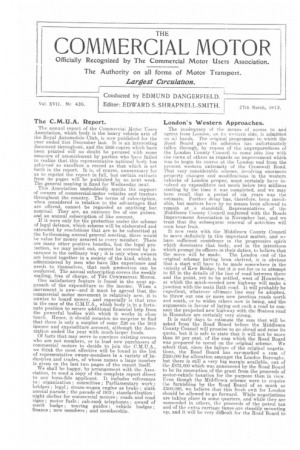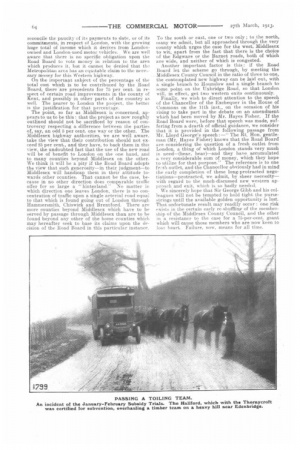The C.M.U.A. Report.
Page 1

Page 2

If you've noticed an error in this article please click here to report it so we can fix it.
The annual report of the Commercial Motor Users Association, which body is the heavy vehicle arm of the Royal Automobile Club, is now published for the year ended 31st December last. It is an interesting document throughout, and the 2500 copies which have been printed will no doubt he perused with some measure of astonishment by parties who have failed to realize that this representative national body has achieved so excellent a record as that which is set forth in the report. It is, of course, unnecessary for us to reprint the report in full, but certain extracts from its pages will be published by us next week. The general meeting is fixed for Wednesday next.
This Association undoubtedly merits the support of owners of commercial-motor vehicles and tractors throughout the country. The terms of subscription, when considered in 'relation to the advantages that are offered, cannot be regarded as anything but nominal. They are, an entrance fee of one guinea, and an annual subscription of like amount.
If it were only for the protection under the scheme of legal defence, which scheme will be elaborated and extended by resolutions that are to be submitted at the forthcoming. annual general meeting, there would he value for money assured to every member. There are many other positive benefits, but the legal protection, we may point out, cannot be covered by insurance in the ordinary way ; it is only when owners are bound together in a society of the kind, which is administered by men who have like experience and needs to themselves, that such pnotection can be oonferred. The annual subscription covers the weekly mailing, free of charge, of THE COMMERCIAL MOTOR.
One satisfactory feature is found in the near approach of the expenditure to the income. When a movement is new—and it must be agreed that the commercial motor movement is relatively new, it is unwise to hoard money, and especially is that true in the case of the C.M.U.A., which body is in a fortunate position to secure additional financial help from the powerful bodies with which it works in close touch. Hence, it should occasion no surprise to find that there is only a surplus of some £20 on the 1912 income and expenditure aecount, although the Association ended the year with much-larger funds.
Of facts that may serve to convince existing owners who are not members, or to lead new purchasers of commercial motors to decide to join the C.M.U.A., we think the most effective will be found in the list of representative owner-members in a variety of industries, and trades, of whose names a large number is given on the last two pages of the report itself. We shall be happy, by arrangement with the Association, to send a copy of the oomplete report direct to any bona-fide applicant. It includes references to : organization ; committee ; Parliamentary work ; bridges ; legal ; steam-wagon engine as brake ; sixth annual parade the parade of 1913; standardization : night shelter for commercial motors ; roads and road signs ; motor fuels ; cab-rank telephones ; award of merit badge ; touring guides ; vehicle badges ; finance ; new members; and membership.
London's Western Approaches.
The inadequacy of the means of . access to . and egress from London, on its western side, is admitted cm all hands. The original programme to which the Road Board gave its adhesion has unfortunately fallen through, by reason of the unpreparedness .of the London County Council to come into line with the views of others as regards an improvement which was to begin its course at the London end from the present western extremity of the Cromwell Road. That very considerable scheme, involving enormous property changes and modifications in the western suburbs of London proper, must certainly have. involved an expenditure not much below two millions sterling by the time it was completed, and we may here recall that a period of six years was the estimate. Further delay has, therefore, been inevitable, but matters have by no means been allowed to remain at a standstill. Representatives of the Middlesex County Council conferred with the Roads Improvement Association in November last, and we trust that the subsequent renewal of activities will soon bear fruit.
It now rests with the Middlesex County Council to move definitely in this important matter, and we have sufficient coniidence in the progressive spirit which dominates that body, and in the intentions which prompt its officers in their duties, to believe that the move will be made. The London end of the original scheme having been shelved, it is obvious that a start will have to be made somewhere in the vicinity of Kew Bridge, but it is not for us to attempt to fill in the details of the line of road between there and the point, yet to be settled, west of Hounslow, at which the much-needed new highway will make a junction with. the main Bath road. It will probably be expedient, whatever ultimate line may be adopted, to throw out one or more new junction roads north and south, or to widen others now in being, and the arguments in favour of laying out such a road to connect the projected new highway with the Staines road in Hounslow are certainly very strong.
It is early days to estimate the sum that will be asked from the Road Board before the Middlesex County Connell will promise to go ahead and raise its quota, but it is safe to state that it will not be more than 50 per, cent. of the sum which the Road Board was prepared to spend on the original scheme. We admit that, since the failure of the original negotiations, the Road Board has ear-marked a sum of 2250,000 for allocation amongst the London Boroughs', but there is still a very big margin available, out of. the 2375,000 which was announced by the Road Board to he its conception of the grant from the proceeds of motor-vehicle taxation for the purpose then in view. F.ven though the Middlesex scheme were to require the furnishing by the Road Board of so much as £500,000, we believe that this fresh exit for London should he allowed to go forward. While negotiations are taking place in some quarters. and while they are suspended in others, the proceeds of the petrol tax and of the extra carriage taxesare steadily mounting up, and it will be very difficult for the Road Board to reconcile the paucity of its payments to date, or of its commitments, in respect of London, with the growing huge total of income which it derives from Londonowned and London-used motor vehicles. We are well aware that there is no specific obligation upon the Road Board to vote money in relation to the area which produces it, but it cannot be denied that the Metropolitan area has an equitable claim to the nece:.sary money for this Western highway. On the important subject of the percentage of the total cost which is to be contributed by the Road Board, there are precedents for 75 per cent, in respect of certain road improvements in the county of Kent, and possibly in other parts of the country as well. The nearer to London the pioject, the better is the justification for that percentage. The point, so far as Middlesex is concerned, appears to us to be this : that the project as now roughly outlined should not be sacrificed by reason of controversy respecting a difference between the parties of, say, an odd 5 per cent. one way or the other. The Middlesex highway authorities, we are well aware. take the view that their contribution should not exceed 25 per cent., and they have, to back them in this view, the undoubted fact that the use of the new road will be of benefit to London on the one hand, and to many counties beyond Middlesex on the other. We think it will be a pity if the Road Board adopts the view that such generosity—in their judgment—to Middlesex will handicap them in their attitude towards other counties. That cannot be the case, because in no other direction does comparable traffic offer for so large a "hinterland." No matter in which direction one leaves London, there is no concentration of traffic upon a single arterial road equai to that which is found going out of London through Hammersmith, Chiswick and Brentford. There are more counties beyond Middlesex which have to be served by passage through Middlesex than are to be found beyond any other of the home counties which May hereafter seek to base its claims upon the decision of the Road Board in this particular instance. To the south or east, one or two only ; to the north, many we admit, but all approached through the very county which urges the case for the west, Middlesex to wit, apart from the fact that there is the choice of the Edgware or the Barnet roads, both of which are wide, and neither of which is congested. Another important factor is this : if the Road Board let the scheme go through, by meeting the Middlesex County Council in the ratio of three to one, the contemplated new highway can be laid out, with a single branch to Hounslow and a single branch to some point on the Uxbridge Road, so that London will, in effect, get two western exits continuously.
Finally, we wish to direct attention to the speech of the Chancellor of the Exchequer in the House of Commons on the 11th inst., on the occasion of his rising to take part in the debate on an amendment which had been moved by Mr. Hayes Fisher. If the Road Board were, before that speech was made, suffering from a dearth of official guidance, we consider that it is provided in the following passage from Mr. Lloyd George's speech :—" The R' t. Hon. gentleman (Mr. Hayes Fisher) knows that the Road Board are considering the question of a fresh outlet from London, a thing of which London stands very much in need—(hear, hear)—and they have accumulated a very considerable sum of money, which they hope to utilize for that purpose." The reference is to one fr2sh outlet, and the Chancellor obviously had in mind the early completion of these long-protracted negotiations—protracted, we admit, by sheer necessity— with regard to the much-discussed new western approach and exit, which is so badly needed.
We sincerely hope that Sir George Gibb and his colleagues will not be tempted to hold tight the purse-. strings until the available golden opportunity is lost. That unfortunate result may readily occur : one risk exists in the certain early re-shuffling of the membership of the Middlesex County Council, and the other in a resistance to the case for a 75-per-cent. grant which will cause those members who are now keen to lose heart. Failure, now, means for all time.
























